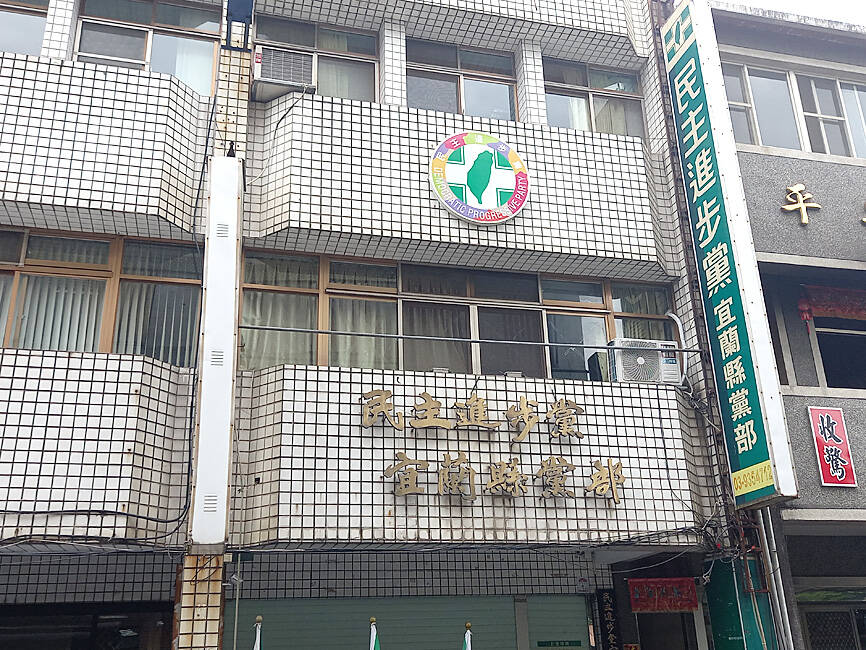The Democratic Progressive Party (DPP) must implement thorough background checks when hiring office staff and appointing officials, party lawmakers said on Sunday after a member was detained on spying allegations a day earlier.
Ho Jen-chieh (何仁傑) is being held incommunicado on suspicion of spying for China during his tenure as assistant to then-minister of foreign affairs Joseph Wu (吳釗燮). The DPP’s Yilan chapter on Sunday expelled Ho.
Ho is the latest DPP figure to be implicated in an espionage probe. Other DPP members accused of being involved in national security breaches include Presidential Office consultant Wu Shang-yu (吳尚雨), former DPP staff member Chiu Shih-yuan (邱世元) and Huang Chu-jing (黃取榮), an assistant to a New Taipei City councilor.

Photo: Chiang Chih-hsiung, Taipei Times
Last month, Sheng Chu-ying (盛礎纓), a former assistant to several DPP lawmakers — including former legislative speaker You Si-kun — was released on bail, as authorities continue investigating allegations that he was recruited by Chinese intelligence during a trip to China.
“We must take these incidents as a warning that our party was not vigilant in observing loopholes in national security... The DPP must bolster checks when recruiting and appointing staff,” DPP caucus executive director Rosalia Wu (吳思瑤) said.
“When hiring aides and office assistants, we must consider the person’s professional training, passion and interest in the job, and identification with Taiwanese consciousness. The recent incidents show that we must be more alert and must close these loopholes,” she said.
The DPP lacks regulations and an oversight mechanism on hiring office staff for legislators, Wu said, adding that there are more comprehensive laws governing appointment of officers for administrative jobs and for aides and secretaries for government ministries, including the Public Functionary Service Act (公務員服務法), the Classified National Security Information Protection Act (國家機密保護法) and amendments to the Cyber Security Management Act (資通安全管理法).
DPP Legislator Chen Kuan-ting (陳冠廷) said that office staff and assistants working for legislators are contract workers and are not vetted for security clearance under the Public Functionaries Appointment Act (公務人員任用法) or the National Intelligence Service Law (國家情報工作法).
Chen suggested amending the law to set up a more comprehensive mechanism that applies across all government agencies and enable detailed background checks when hiring legislative office staff and appointing officers to government ministries.
He said the vetting process for security should include their financial history, records of exits and visits to other countries, and criminal offenses and convictions, to prevent security breaches and lower risks of recruitment by China for spying.
Lower-ranked staff also have low wages and no clear career path, making them more susceptible to being enticed by monetary rewards from China to work as spies, a DPP member who declined to be named said.
Some of the recent incidents involved senior-level aides to key party figures, and they should have been monitored by the Ministry of Justice Investigation Bureau under the Regulations on Special Checks of Civil Servants Involved in National Security or Significant Interest (涉及國家安全或重大利益公務人員特殊查核辦法), but this was not done, the person said, adding that the party must re-evaluate the way it hires legislative staff.
Per the instructions of President William Lai (賴清德), in his capacity as DPP chairman, the DPP is considering setting up an “urgent financial need assistance program” for party employees to provide subsidies when they experience financial difficulties to prevent China from taking advantage of the situation to recruit spies, the person said.

The Coast Guard Administration (CGA) yesterday said it had deployed patrol vessels to expel a China Coast Guard ship and a Chinese fishing boat near Pratas Island (Dongsha Island, 東沙群島) in the South China Sea. The China Coast Guard vessel was 28 nautical miles (52km) northeast of Pratas at 6:15am on Thursday, approaching the island’s restricted waters, which extend 24 nautical miles from its shoreline, the CGA’s Dongsha-Nansha Branch said in a statement. The Tainan, a 2,000-tonne cutter, was deployed by the CGA to shadow the Chinese ship, which left the area at 2:39pm on Friday, the statement said. At 6:31pm on Friday,

The Chinese People’s Liberation Army Navy’s (PLAN) third aircraft carrier, the Fujian, would pose a steep challenge to Taiwan’s ability to defend itself against a full-scale invasion, a defense expert said yesterday. Institute of National Defense and Security Research analyst Chieh Chung (揭仲) made the comment hours after the PLAN confirmed the carrier recently passed through the Taiwan Strait to conduct “scientific research tests and training missions” in the South China Sea. China has two carriers in operation — the Liaoning and the Shandong — with the Fujian undergoing sea trials. Although the PLAN needs time to train the Fujian’s air wing and

Taiwanese celebrities Hank Chen (陳漢典) and Lulu Huang (黃路梓茵) announced yesterday that they are planning to marry. Huang announced and posted photos of their engagement to her social media pages yesterday morning, joking that the pair were not just doing marketing for a new show, but “really getting married.” “We’ve decided to spend all of our future happy and hilarious moments together,” she wrote. The announcement, which was later confirmed by the talent agency they share, appeared to come as a surprise even to those around them, with veteran TV host Jacky Wu (吳宗憲) saying he was “totally taken aback” by the news. Huang,

The American Institute in Taiwan (AIT) put Taiwan in danger, Ma Ying-jeou Foundation director Hsiao Hsu-tsen (蕭旭岑) said yesterday, hours after the de facto US embassy said that Beijing had misinterpreted World War II-era documents to isolate Taiwan. The AIT’s comments harmed the Republic of China’s (ROC) national interests and contradicted a part of the “six assurances” stipulating that the US would not change its official position on Taiwan’s sovereignty, Hsiao said. The “six assurances,” which were given by then-US president Ronald Reagan to Taiwan in 1982, say that Washington would not set a date for ending arm sales to Taiwan, consult